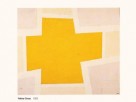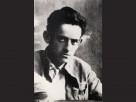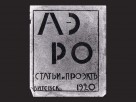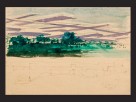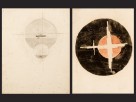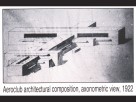Suprematism, UNOVIS and Lazar Khidekel
Exhibit Venue:
Harriman Institute | Columbia University918 IAB (panel); Harriman Atrium (reception) | 420 West 118th Street, 12th Floor, NYC
Exhibit Date:
September 10 - October 15, 2014Join us for a reception and panel discussion to commemorate the 100 years of Suprematism, 95 - of UNOVIS (Affirmers of the New Art) and the 110th Anniversary of Lazar Khidekel (1904-1986), the Suprematist artist, visionary architect, pioneer of environmentalism and founding member of the UNOVIS group.
RECEPTION & PANEL DISCUSSION: October 8, 6:00 PM | 918 IAB (panel); Harriman Atrium (reception)
The exhibition includes twenty four images in print form - paintings, drawings, period photographs, UNOVIS documents, and publications, including the legendary AERO, Khidekel’s handmade book from 1920, considered as one of the first ecological manifestos of the modern era. This rich set of material comes from the Khidekel Archive, one of the most comprehensive archives of the Russian avant-garde.
Moderated by Dr. Regina Khidekel, the discussion will explore different aspects of Suprematism including the Unovis educational system, the Suprematist painting and its development in the works of the younger “UNOVIS” generation. Also to be examined Lazar Khidekel's Suprematist painting, his role in the transition of Suprematism from a 2-dimensional art form to a movement which found its expression in real life - visible today in architecture, the processes of urbanization, and futuristic yet environmentally conscious city planning of the time.
Speakers: Dr. Regina Khidekel, art critic, curator and president of the Lazar Khidekel Society, director of Russian - American Cultural Center in New York - York (RACC), the author of numerous publications on the history of Russian avant-garde.
Slide presentation about life and work of Lazar Khidekel.
Dr. Masha Chlenova
The Endpoint of Painting: UNOVIS and the Transformation of the Lived Experience
A few months after his arrival at the Free Art Studios in Vitebsk in late 1919, Kazimir Malevich announced that the medium of painting had reached its limit and it was time to create art that would directly transform the fabric of everyday experience. “Having established definite plans for the Suprematist system,” the artist wrote inDecember 1920, “I am entrusting the further development of what is now architecturalSuprematism to young architects in the broadest sense of the word.”
This talk will explore the inner logic of development of Malevich’s abstract system and the expanded form it took in the artistic practices of the collective UNOVIS, whose members decorated streets, designed printed materials, created reliefs and architectural models. Driven by a paramount urge to transcend boundaries between artistic mediums, UNOVIS created a radical language that briefly became synonymous with the highest ideals of the revolution. The formative stages of Lazar Khidekel’s artistic practice will be examined in this context.
Masha Chlenova is an art historian and curator specializing in 20thcentury art with a focus on Russian avant-garde. She received a PhD in Art History from Columbia University with a dissertation entitled “On Display: Transformations of the Avant-garde in Soviet Public Culture, 1928-1933.” Most recently she was a curatorial assistant at the Department of Painting and Sculpture at The Museum of Modern Art, where she worked with Leah Dickerman on a major survey of abstraction across the mediums entitled Inventing Abstraction, 1910-1925 and an upcoming retrospective of Francis Picabia. Her writing has appeared in the journal October and in exhibition catalogs published by MoMA, the Guggenheim Museum, and Tate Modern.
Anna Bokov, Ph.D. Candidate, Yale University,
will talk about the pioneering educational systems at Unovis and Vkhutemas. Although short-lived, these avant-garde schools were critical platforms for experimenting with new design methods and for developing new modernist design language.
Dr. Xenia Vytuleva
“Decoding Modernities”
Operating with formulas, algorithms and codes, Soviet Avant Garde architecture still remains a black box in the context of modern histories. Dr. Vytuleva’s talk is addressing Avant Garde legacy, its interrelation with the neo-scientific discourse, migration of metaphors and tropes from various ideological and disciplinary platforms,contextualizingthe legacy of Lazar Khidekel’s spatial experimentswithin a broader fabric of contemporary cultures.
Xenia Vytuleva is an architecture historian and theorist and curator. She holds a Ph.D. in Art History and is currently a visiting assistant professor at Columbia University in NY. A recipient of various grants and awards, and most recently the Graham Foundation for the Project "Soviet Secret Cities during the Cold War", dr. Vytuleva is writing extensively on theory of preservation and theory of Architectural Representation. A head researcher at the Institute of the Theory and History of Architecture (NIITIAG) at the Russian Academy of Science, Moscow, Vytuleva is currently working on a book entitled “Aesthetics of Uncertainty in Experimental Practices of the 20th Century”. She is a member of DoCoMoMO, Russia, and the program “Preserving the Architectural Heritage” in Moscow, co-organizer and consultant of Columbia University platform at Venice Biennale 2014.
About Lazar Khidekel
Lazar Khidekel worked closely with Marc Chagall, El Lissitzky and Kazimir Malevich in Vitebsk from 1918 to 1922, where he became an important proponent and theoretician of Suprematism and a founding member of the UNOVIS group (Affirmers of New Art), which included other notable artists such as El Lissitzky, Nina Kogan, Vera Ermolaeva, IlyaChashnik, and Nikolai Suetin.
While still a student of Petrograd/Leningrad Institute of Civil Engineers (1922-1929), Lazar Khidekel became an influential force in fueling Suprematist ideas among faculty members and students, by lecturing, building bridges between LISI and INKhuK, and creating the first Suprematist architectural project - the Workers' Club (1926). Widely published in Russia and abroad, this project expressed the new direction of Leningrad avant-garde architecture, the Suprematist Constructivism.
In the 1920s, Lazar Khidekel, the only architect in Malevich's group, developed innovative ideas for futurist cities which included communal houses and Suprematist skyscrapers, suggesting a new way of life. Among his realized projects were socialist towns conjoining industrial and residential complexes (1930-1932), the first radio-theater, House of Radio, the first three-hall Movie Theater, as well as schools and educational institutions. Khidekel’s projects of the 1930s were granted landmark status in the 1960s.
Today, with the rise of the Internet as a platform for independent thinkers, we can learn a great deal about the relevance of Khidekel’s visionary projects, as seen in two recent online discussions of this aspect of his work:
Khidekel’s vision still manage to look futuristic, arguably more so than most of the Metabolists or Situationist projects that today feel retro-futurist, inextricably tied to the past. Khidekel’s work remains endlessly floating towards the future.
As Edwin Heathcote from Financial Times states: “Khidekel is barely known compared with his now-stellar contemporaries, yet in his fusing of art, architecture and urbanism, he remains arguably the most visionary of them all.” http://www.ft.com/intl/cms/s/2/0c4b0fde-0d04-11e4-bcb2-00144feabdc0.html#axzz38Sx7gLsE
A documentary film Lazar Khidekel, KanalKultura, 2011, and animation Khidekel Element – Suprematism for Humanity from the ongoing The 14th International Architecture Biennale in Venice, will also be shown.
